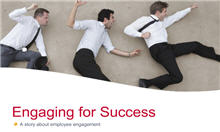
Jan van den Nieuwenhuijzen: 'The focus is too much on the short term'
Jan van den Nieuwenhuijzen about sustainable HR
If all the taps of the world were about to run dry, the call for sustainability would be deafening. Jan van den Nieuwenhuijzen, CEO of SD Worx, asks himself what stops companies from treating their employees like this as well 'This capacity will run out too, and thus it also warrants sustainability.'
Jan van den Nieuwenhuijzen: 'Not a single company hires employees for fun. You don't hire people because it's nice to have people around you but to do business or to complete a mission. In the social profit this means care or providing education, in the public sector fulfilling the role of the government. That is the only reason why you have employees. Now that we are heading for a period of scarcity on the labour market, it will be less easy for companies to find employees and therefore to do business. Companies who want to keep this up will have to pursue a policy that guarantees the company has enough people – with the right competencies – not only now but in ten years as well.'
Jobat: That seems obvious, what exactly is new about this vision?
Jan van den Nieuwenhuijzen: “Two elements. First of all, the HR policy will have to be more aligned to the business and secondly the business will have to be much more involved in the HR policy. These two things are not happening enough yet.”
Is HR undervalued in companies then?
Jan van den Nieuwenhuijzen: “Yes, management needs to be more involved in HR. HR is not just the responsibility of the HR management, it is a responsibility of all managers in the whole organisation. Making it clear where the business wants to go to, creating direct appreciation, making sure that people have the space to do their job well is much more the responsibility of the manager than HR, which needs to provide the tools. In fact, HR can only do this properly if it has an understanding of the business of a company. In quite a few companies HR is kept well away from the business. In this sense the department is certainly undervalued.”
“Before you can speak of a sustainable HR policy, it needs to have its place in the organisation. That is a basic condition. Only in this way will you be able to increase the engagement of your employees. Moreover, studies have shown that only a small percentage of the really engaged employees would consider another job. And for satisfied employees, which are not the same as engaged ones, the percentage is higher.”
Holding on to your current employees is one thing. How do you convince your potential employees of your sustainability?
Jan van den Nieuwenhuijzen: “In the coming years 'branding' will be very important for companies. If you have job vacancies and you communicate about them you at least need to make sure that people want to listen to you.
What are the 'sales arguments' for companies?
Jan van den Nieuwenhuijzen: “Communicate what you stand for. For instance, is SD Worx a payroll processing company that calculates wages or do we help companies with their HR processes? That is another definition and positioning. But the most important thing will undoubtedly be how a company's employees talk about the company and how that company deals with them. This mouth-to-mouth advertising plays an important role.”
Will a sustainable HR policy change the working relationship between employer and employee?
Jan van den Nieuwenhuijzen: “I think it will. In this model you no longer have two groups – employer and employee – but two groups who together look for the best way to organise the work. This fundamentally changes the balance of power. The boss needs to be someone who is able to keep the team together and knows the best circumstances for this.”
What can stand in the way of sustainable HR?
Jan van den Nieuwenhuijzen: “That the focus remains too much on the short term. Companies facing short term issues often lose sight of the long term. But the biggest threat is that both companies and society are not working enough on 'softer' values. And this field of tension will not go away. You also sense it in society. As soon as there are too few employees, the workload will increase even more. The rat race will continue. But I am also convinced that companies who choose not to follow this route will be attractive employers.”





